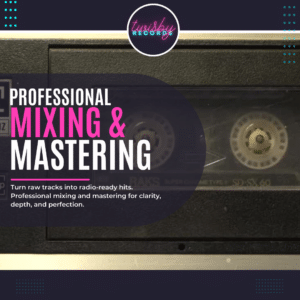Hello again my friends!
Have you ever felt stuck in your creative process, endlessly tweaking your demo without ever finishing the track? This acommon phenomenon, known as demoitis, can derail even the most talented musicians and producers. Let’s dive into what demoitis is, why it happens, and, most importantly, how you can break free to create polished, professional music.
Table of Contents
What is Demoitis?
Demoitis, also known as ‘demo love,’ is a phenomenon that occurs when someone becomes so attached to a song’s demo version that they have difficulty accepting or improving upon it. This can make it hard to complete a project or deliver a polished final product.
This attachment can hinder the creative process, making it difficult to finalize the project or deliver the polished, professional result expected in the industry.
Demoitis is an appropriate term, because it is certainly a crippling disease. Falling in love subconsciously with your rough draft is a song killer, because it will make it impossible to surrender your attachment to make the necessary changes for it to be all that it can be.

Why Does Demoitis Happen?
1. Familiarity
One of the main reasons demoitis occurs is because of familiarity. When you listen to a piece of music repeatedly, your brain becomes accustomed to its specific structure, arrangement, and overall sound. As a result, any changes made to the track might feel wrong or unnatural, even if they objectively improve the quality of the song.
Listening to your demo repeatedly hardwires the initial version into your brain causing changes, no matter how objectively better, feel “wrong” because they deviate from what your brain has accepted as the default. This is why stepping away from the track for a while can help reset your ears and regain objectivity.
2. Emotional Connection

Another contributing factor to demoitis is the emotional connection that we, as creators, develop with our work. Music is an emotional art form, and it’s only natural for us to become attached to the raw, unfiltered ideas that come straight from our hearts and minds. When the demo captures a specific mood or feeling, it can be tough to let go of that initial emotional connection and accept changes to the piece.
Story time! I’ve recently been collaborating on a project with someone that had become emotionally attached to the sound of the vocals on the demo mix on their song. They had been at this for a number of months, and had already been to another studio to have a real mix of their song done. They were not happy with that mix and had decided to collaborate with me to take it to the next level.
After getting the mix dialed in, and working through the big picture and the more minute details, they decided that the vocals on the demo mix of the song were still better. In my opinion, everything was a night and day difference from where they had started, and where we ended up while collaborating over this.
This is a classic example of not only being too familiar with it by working on it so long, but also being very emotionally attached to it clouding their judgement over what would serve the song the best. Now, you can argue that the artistic vision is all that matters because music is art at the end of the day.
There is merit to this. However, integrity should not shut you down to making changes and concessions that will only enhance and serve the overall song. Stand your ground if it turns it upside down absolutely, but also know when to step away for a break to zoom at and look at the big picture and consider how some changes will be beneficial.
My role, especially in the mixing capacity is to help those I am collaborating with in achieving their overall vision for their art. I’ll offer guidance, and my opinion where beneficial of decisions that I think are smart and will better serve the end result of the song. Right, or wrong, if any artist wants something done a specific way I will do it that way.
Your demo might capture a raw, authentic emotion that you fear losing with additional production. This connection can make you resistant to necessary adjustments, like re-recording parts or changing the arrangement. However, remember that the emotional essence can often be preserved ,and even enhanced, in a polished final version.
3. Fear of Change and Judgment
The fear of change and judgment also plays a significant role in demoitis. Sometimes, we become so comfortable with the demo version of a song that we are afraid to make alterations for fear of losing what made the song special in the first place. This fear can be heightened when we consider how others, such as collaborators or listeners, might perceive the changes. In some cases, we might even worry that the revised version won’t live up to the expectations of our audience.

4. Over – “Tweaking”
Sometimes, demoitis isn’t just about emotional attachment or fear of judgment, it’s also the result of overworking a track. As musicians and producers, we often strive for perfection, but this pursuit can quickly spiral into an endless cycle of tweaks and revisions. The more you adjust a song, the harder it becomes to hear it objectively, and before you know it, you’ve spent hours, or even days, making changes that don’t necessarily improve the track.
Why Over-tweaking Happens
1.An Abundance of Tools and Options
Modern music production offers a near-limitless array of plugins, effects, and tools. While these options can spark creativity, they can also lead to decision fatigue. It’s easy to get lost trying to find the “perfect” reverb or EQ setting, forgetting that the heart of the song matters more than any technical nuance.
2. Fear of Finishing
The more you refine a track, the harder it becomes to commit to a final version. There’s always a lingering “What if?…. “what if this could sound a little better?…. What if I’m not done? This fear can trap you in a cycle where nothing ever feels complete.
3. Losing Perspective
Listening to a song repeatedly can dull your ability to evaluate it objectively. You start obsessing over tiny details, like whether the kick drum is loud enough, while losing sight of the overall impact of the track.
Over-tweaking a track often stems from a good place, its a desire to make your music the best it can be. But without limits, this desire can derail your progress and lead to frustration or burnout. By setting boundaries, taking breaks, and seeking outside input, you can avoid the trap of over-tweaking and bring your song to completion with confidence.
Remember, a finished track… flaws and all…. has far more potential to connect with listeners than one that’s perpetually stuck in the editing phase.
Breaking Through Demoitis: Tips and Strategies
Now that we have a better understanding of demoitis and its causes, let’s explore some strategies and techniques for overcoming this creative roadblock.
1. Take a Break
The first and most straightforward strategy for breaking through demoitis is to take a break from the project. This might mean stepping away from the song for a few days, a week, or even longer, depending on your needs. Giving yourself some space from the demo will allow your brain to reset and approach the track with fresh ears. You might be surprised by the clarity and perspective you gain from a little time away.
2. Collaborate with Others
Another useful tactic for overcoming demoitis is to collaborate with others. Working with a fellow musician, producer, or songwriter can provide a fresh perspective on the track and help you identify areas that need improvement. A collaborator’s input can be invaluable in breaking the emotional attachment and overcoming the fear of change, as they are not as personally connected to the demo as you are.
There are no shortage of producers, artists, or engineers out there. The vast majority of them are always looking to collaborate. Seek out those that are looking for a fresh set of ears to put on their work, and are open to lending their own ears to others as well.

3. Set Objectives and Deadlines
Setting clear objectives and deadlines for your project can help keep you focused and motivated to move past demoitis. Break the process down into smaller tasks, such as finalizing the arrangement, recording high-quality vocals, or mixing and mastering the track. By establishing specific goals and deadlines for each task, you’ll be more likely to stay on track and avoid getting stuck in the demo stage indefinitely.
You may have heard it said that you have your whole life to release your first album. With that kind of timeline it may not ever get done. Objectives and deadlines will help to put the pressure on in ways that will force you to make decisions. An abundance of time will always make it impossible to make hard and fast decisions because it leaves you open to tweaking into oblivion.
You might find it helpful to act as if you have a label deadline to make, and missing that deadline means missing out on your release, and your payday.
4. Embrace Change and Experimentation
One of the most effective ways to break through demoitis is to embrace change and experimentation. Remind yourself that the demo is just a starting point and that the creative process often involves refining and evolving your initial ideas. Don’t be afraid to try new things, explore different sounds, or restructure the song. Sometimes, these changes might not work out, but they can also lead to a more polished and compelling final product.
You are always going to be your harshest critic. With 8 billion people on this planet currently, you can rest assured that there are many people out there that will get your art, and be able to appreciate it for what it is. Don’t get in your own way by thinking everything you do sucks while experimenting and trying different ideas. There’s no better way to beat demoitis!
5. Compare Your Demo to Professional Releases
A helpful technique for overcoming demoitis is to compare your demo to professional releases in your genre. Analyze the differences in production quality, arrangement, and overall sound, and use this comparison as a guide for your revisions. This exercise can help you identify areas where your demo might be lacking and give you a clearer direction for improvement.
This requires the skill of being able to listen to something critically, and deconstruct a song into its base ingredients. What does the kick drum sound like? Where does it sit in the mix? Are the guitars double tracked, or quad tracked? Are there elements offering one or more counter melodies to the main melody that is being sung, or played by a certain instrument?
Critical listening skills will only serve to help you become better in all facets of writing and producing your music.

6. Record Multiple Versions
If you’re struggling to let go of the original demo, consider recording multiple versions of the song. Experiment with different arrangements, vocal styles, or production techniques and keep each version as a separate project file. This way, you can always return to the original demo if you truly believe it’s the best version, but you might also discover that one of the alternate versions brings new life to the song.
7. Trust Your Instincts and Be Objective
Lastly, trust your instincts and try to be objective when evaluating your work. As a creator, it’s essential to maintain a balance between the emotional attachment to your music and the ability to view it objectively. If you can develop this skill, you’ll be better equipped to make tough decisions about your projects and move past demoitis.
If you are brand new to writing music, and are on your own, collaborating with someone else will seem like a foreign concept and may not be easy at first. As you open up to outside ideas and input you’ll start to develop a more keen sense of what to do and where to go in achieving your vision.
It will spur a lot of artistic growth very quickly, and serve to help you figure out your own artistic identity. Once you are in tune with your instincts you will find it much easier to avoid falling into the trap of being stuck in demoitis hell.
8. Limit Your Listening
Avoid playing your demo repeatedly outside of your production sessions. Over-listening can deepen your attachment and make it harder to accept changes. Instead, limit playback to when you’re actively working on the song.
If you absolutely have to listen to the song again, listen to more recent bounces to ensure you don’t get to attached to one version.
FAQ
Can demoitis affect professional artists?
Absolutely! Even seasoned artists can fall into the trap of demoitis. The difference is that professionals often have teams, producers, engineers, and collaborators, who can provide fresh perspectives and help them move forward.
How can I tell if I have demoitis?
If you find yourself obsessively tweaking your demo without making meaningful progress or resisting changes suggested by collaborators, it’s a sign you might have demoitis.
Should I share my demo with others?
Yes! Sharing your demo with trusted collaborators or mentors can provide valuable feedback and help you overcome attachment to the original version. BUT this doesn’t mean send it to your mom, or your friends, who will just say “I Like it”. Send it to people who will give you genuine actionable feedback. If you don’t have anyone who fits that mold, send it to us and we will listen.
So, This Is a Curable Disease?
Yes, this is not a terminal diagnosis for your art.
Demoitis can feel like a creative roadblock, trapping you in a cycle of overanalyzing your tracks until you can’t hear them objectively. Overcoming this challenge is crucial to realizing your music’s full potential.
At Twisby Records, we understand the frustration of not knowing when your song is truly ready, and we’ve seen how the right perspective can make all the difference. The key to moving forward lies in finding a fresh perspective and having the confidence to commit to your final mix. That’s where expertise and collaboration can help ease the burden.
















